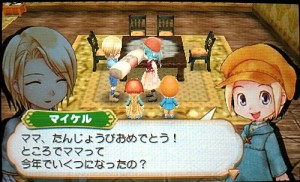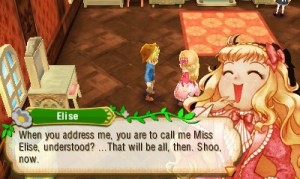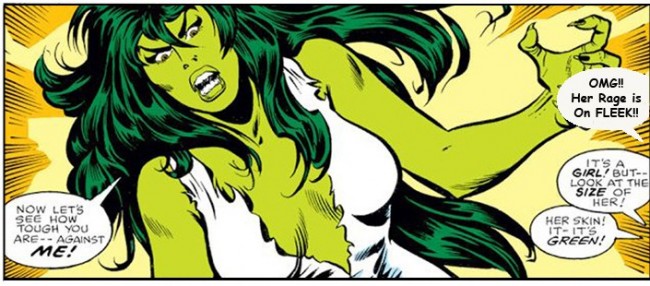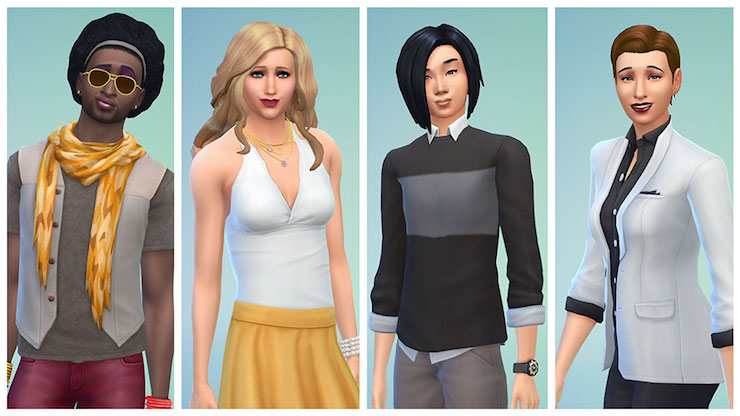Romance can sometimes be a tricky and troubling thing, and it appears that this is no different in the the virtual world. In my review of Story of Seasons, a new addition to the Harvest Moon franchise that had to undergo a name change due to licensing issues, I described how much I loved that Story of Seasons resembled an updated and expanded Harvest Moon game. After all, I could do everything I loved to do in previous incarnations with some graphical improvements and new additions. But unfortunately it seems that one of the less desirable characteristics of Harvest Moon has at least partially made its way into this new game: the tendency to feature some problematic and stereotypical male romance options for players using a female avatar.
You may remember that I wrote about my disapproval of the romance options in Harvest Moon DS Cute last year. To give a little bit of a recap: this edition, which was a reboot of a previous Harvest Moon with a female playable character rather than the original male one, transformed some of the existing male townsfolk into your romance options rather than adding new ones. Unfortunately there weren’t many men your character’s age around town, so you mostly only had older men to choose from for your young, female character to romance and eventually marry, with one main exception. This exception was the young and attractive Skye who was exclusive only in this edition. Skye was a notorious thief, playboy, and general asshole who would flirt by mocking, teasing, and belittling your character. If you followed his romance quest, you had to work to change him and make him see the fault in his past behavior and actions. It was a little creepy to see this kind of unhealthy and concerning relationship depicted in what is otherwise a very child-friendly game, and it particularly concerned me that I basically only had the option to suck it up and romance him or awkwardly romance someone much older than me who was never intended to be a romance  option in the first place.
option in the first place.
I’ll preface the rest of my discussion by stating that none of Story of Seasons‘ romance quests are anywhere near as problematic as the one I experienced with Skye in Harvest Moon DS Cute. Furthermore, because the Harvest Moon games have always required that your character get married and have children in order to progress forward in the game and have unfortunately never really allowed you to marry someone of your avatar’s own gender, I will refrain from discussing them here. Instead, I want to discuss how many of Story of Seasons‘ bachelors and bachelorettes are rooted in stereotypes, particularly stereotypes based on traditional gender constructs.
Although I haven’t played fully through all the possible romance options (creating a bond with these characters takes time, which is apparently something that’s rather true to life), you can clearly identify the constructs these characters are based on simply by reading the manual’s introduction to them. A few of the phrases used to describe the bachelors include “every inch a gentleman . . . rumors he has a rather colorful past,” “kindly nature towards the ladies . . . mistaken for a playboy,” “given to displaying a testy temperament” and “a smooth talker.” Although these are perhaps a little overstated based on what I’ve seen thus far and nowhere near Skye levels of obnoxious, many revolve around social constructs of what makes an attractive male romance option: the traditional gentleman figure (fulfills traditional ideals of chivalry despite its tendency to be patronizing towards women), the one with a temper but who’s shy and good deep down (men have tempers but you need to look past that), the one who can charm the ladies (can play around, but you can woo him over), the one who is stoic and doesn’t show emotions easily (real men don’t cry). Unfortunately some of these should realistically and justifiably be warning signs, with these negative traits being excusable because of their redeeming qualities like “earnest person at heart” “brings a sense of dignity and class,” “sincere,” and “gets along easily with most anyone.”
This might not be as noticeable of a problem if the bachelorettes’ “character flaws” didn’t point out how gender ideals were very much incorporated into the design of these characters. The following phrases were what would be considered their “negative” characteristics: “prone to stuttering when she gets embarrassed,” “rumor has it that no one has ever seen her get angry,” “may be a bit brusque,” “not always the most organized . . . sometimes forgets to do mundane things like eat and sleep,” “has a mischievous streak that sometimes gets the better or her,” and “somewhat spoiled and selfish.” Beyond the rich and spoiled girl who needs to learn the rewards of doing work for one’s self (which is a stereotype in and of itself), many of these traits do more to contribute to the characters’ charm and appeal than make them realistic characters or  act as a potential downside for romancing the character: one is so invested in her work she forgets to take care of herself (she can’t take care of herself and needs someone to fulfill that role), one is a little self-conscious (she needs someone to show her how talented she is), one has the tendency to get in over her head (she needs help getting out of stick situations). Not only are these traits distinctively “cute” and typically regarded as feminine qualities that might be considered endearing, when they’re compared to the negative traits some of the bachelors have, it seems somewhat like a slap in the face.
act as a potential downside for romancing the character: one is so invested in her work she forgets to take care of herself (she can’t take care of herself and needs someone to fulfill that role), one is a little self-conscious (she needs someone to show her how talented she is), one has the tendency to get in over her head (she needs help getting out of stick situations). Not only are these traits distinctively “cute” and typically regarded as feminine qualities that might be considered endearing, when they’re compared to the negative traits some of the bachelors have, it seems somewhat like a slap in the face.
Should Story of Seasons, a rather innocent game by all accounts when compared to others we discuss here, that can essentially be classified as a “fantasy/wish fulfillment” game be critiqued this heavily for providing romanceable characters that honestly reflect the tropes that are commonly found in a lot of mainstream fiction? Maybe not, but sticking to these stereotypes, even if just a little, doesn’t do anything to help the game and risks creating more expectations that these stereotypes and tropes are what someone should expect in a real-life partner.





3 thoughts on “The Rhetoric of Romance in Story of Seasons”
just stumbled on this website for the first time. as something of a diehard gamer who nonetheless came of age in a troubled time and gained many qualms with such societal depictions in video games (like this mentioned in this article), i am appreciating much of what i am reading and find it quite refreshing, given that most entertainment media does not concern itself with maintaining any sort of social awareness in its critique and commentary of that media, much less that which focuses on games. however, i am finding particular difficulty in swallowing this piece whole…for a few reasons.
it seems to me that such commentary as you are providing should and would want to be provided in the hopes of effecting some change in the world. as a (seemingly) longtime fan of the series, you would know as i do that the kinds of gender stereotypes you touch on as present in story of seasons are just downright ubiquitous in essentially every harvest moon title. as a boy growing up i took no issue with the depictions of such romance options as ann, elli, popuri, maria, and karen, being that i didn’t know any better. but having reached adulthood, i can no longer look at a game like harvest moon 64 the same way. there are myriad issues with a romance simulation (which is effectively what harvest moon is), not the least of which is the idea that the player can have access to any female that he so chooses. this fact is more problematic to me than the actual representations of the girls themselves, which are admittedly stereotypical as all hell. in each case, the girl is presented as needing the player to “rescue” them, in a sense, from their own negative qualities, much in the same way that you point out about this newer title.
what i fail to understand is what the expectation is. so you’ve written an article rightfully exposing the gender stereotypes in a romance/FARMING simulation game. do you see the problem here? the problem is that the context in which the game itself takes place is so bombarded by the kinds of “gendering” that you point out, far beyond even just the gendered stereotyping of individual characters, that it seems quite obvious that there is no saving it. what i guess i’m saying is that there is probably little to no way to write a harvest moon title that would eliminate such stereotypes (partially for the reason that the character models can only be fleshed out so far, and partially due to severe societal biases on the part of the developers), and if there were…there is no way the developers would do so.
perhaps this comment seems a bit more incendiary than i intend it to be, but i just want to say that i do in fact agree with everything you said. i guess i’m just trying to contextualize the purpose behind the critiques present on this website as a whole, as it seems that you are talking to almost no one except me. and sadly, i do not work for marvelous interactive (or whoever the hell develops this series now :P).
thoughts?
furthermore, the things you mentioned in this article are actually the bulk of the reasons why i can’t bring myself to play newer harvest moon titles. i can still play old titles such as 64, fomt, btn, awl, and mm, but seemingly only out of a sense of nostalgia, and when i do, the “flatness”, so to speak, of the female characters is painfully obvious to me. however, i suppose that even many of the male characters, as you pointed out, are also flat in that way.
I see what you’re saying, and I understand: the Harvest Moon series is not going to feature super realistic romance and characters like, for instance, a Bioware game would. And I’m not asking them to do this or to ditch all of their tropes. Tropes aren’t necessarily bad, after all. But they don’t have to use tropes rooted in gender norms and base their romance options on harmful ideas of what an idealized fantasy romance would entail. I’ve always maintained that Harvest Moon is a social game, a game about building relationships and balancing work and social life just as much as it is about farming (after all, the most recent actual Harvest Moon removed almost all the village aspect and it felt hollow). But I don’t think it has to be about romance or be a makeshift a dating sim. I do think the option should be there, albeit with some less harmful tropes, but I don’t think it should be mandatory. I’d say that it shouldn’t be a requirement for moving on in the game – players shouldn’t “lose” if they don’t find a spouse and the options shouldn’t be the makings of a harmful relationship like “changing” a hard to get playboy or finding a meek wife to have your kids. Does that make sense?